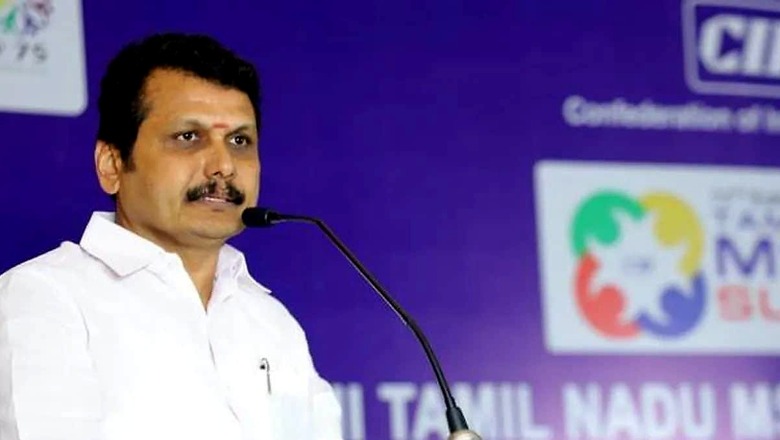
views
Prime Minister Modi, while delivering a virtual address after distributing around 70,000 appointment letters at Rozgar Mela today, mentioned some states where the candidates need to pay for a government job. The PM was referring to a report by News18 about an investigation by the Enforcement Directorate blowing the lid off a cash-for-job scam in West Bengal. Significantly, this is the second scam in recruitment for government jobs in the state.
Hours after the PM mentioned recruitment scams in his speech, V Senthil Balaji, a senior cabinet minister in the DMK-led government in Tamil Nadu, was arrested by the Enforcement Directorate (ED) on Tuesday after a marathon interrogation in connection with a money laundering and job racket case.
The central agencies are probing into similar recruitment scams in Tamil Nadu too. In 2022, the ED arrested Partha Chatterjee, West Bengal’s former education minister in connection with the teacher recruitment scam. The ED has now summoned the state’s education secretary too.
Though the ED and CBI are currently probing the teacher and municipality employees’ recruitments in West Bengal, such scams have existed in India for years. For context, here are some of the instances of massive recruitment scams in government services.
A decade ago, the country witnessed the multi-crore rupees ‘Vyapam’ (Vyavsayik Pariksha Mandal) scam in several politicians, government officers were involved, with several victims affected, and nearly 40 reportedly died of having links to the exam fraud.
The entrance examination and recruitment scam happened through Madhya Pradesh Professional Examination Board. The scam, unearthed in 2009, was initially investigated by the state police and later was handed over to the CBI. The investigation led to arrests of senior ministers, bureaucrats and their associates.
The probe is still continuing as the CBI submitted a supplementary charge sheet last year too. Through this scam, hundreds of candidates got fake medical degrees by paying bribes, however, the Supreme Court in 2017 cancelled degrees of over 300 such candidates. The Vyapam scam had huge political ramifications and left a lasting impact.
All complaints are lodged under the Prevention of Corruption Act.
Coming back to the present time, the central and state agencies are investigating the teacher and municipality recruitment scams in West Bengal, electricity board and excise recruitment scams in Tamil Nadu and Grade II teacher recruitment scam in Rajasthan.
How do these scams happen?
There are different types of modus operandi for different states and different positions in government. In the West Bengal teacher and municipality recruitment scams, the job racketeers, in connivance with the local politicians, bureaucrats and other government officers, manipulated the Optical Mark Recognition (OMR) sheets.
During raids, the ED seized hundreds of such OMR sheets. The racketeers allegedly exploited the system by altering or changing the answer options of successful candidates and by mixing the groups of papers leading to disqualification of successful candidates.
Vyapam scam turned out to be an organised ring of racketeers who were committing the same irregularities since the 1990s. It led to multiple FIRs through 90s and then in 2000. But the scam and its impact came under focus after 2009, when the state government formed an inquiry committee. By colluding with government officers and by bribing them, hundreds of undeserving candidates got high ranks in the entrance tests and received their certificates.
In both Madhya Pradesh and West Bengal recruitment scams, senior ministers and bureaucrats among others were arrested. For Tamil Nadu, the ED has initiated investigation as it started conducting raids.
Why do recruitment scams take place in government services?
News 18 spoke to several experts, former police officers to understand why do people give money to get a job?
A senior serving police officer, who requested anonymity, said people look at government jobs as the permanent solution for their whole life. “Unlike private companies or contractual jobs, there is no hiring and firing. There is not much accountability at the group C or D level. But the recruitment systems are generally layered. So, candidates want to take short cuts for life long jobs with security and benefits,” the officer said.
The rackets often include powerful politicians and influential officers so it is difficult to crack, added the officers.
The states and central organisations have different recruitment rules. For instance, according to the West Bengal Municipal Employees’ (Recruitment) Rules, 2005, a clerk-cum-typist can be recruited directly. For direct recruitments, the candidate has to pass Madhyamik or equivalent examination from any Board recognised by the government; have to have skills of English typing speed of 30 words per minute and Bengali typing speed of 20 words per minute; and knowledge of working with computers.
The minimum age limit for such recruitment is 18 years. Despite tests, the racketeers manage to bypass the whole procedure and take money from the candidates to get them on the recruitment list. The kickbacks and commissions go to the concerned officers and politicians.
As long as the candidate, who paid money, gets the job, nobody complains. But if the racketeer falters in getting the candidate on the list, things go bitter. In both the events, the loser is the common man. As a candidate, who gets a job based on a bribe, is anticipated to be corrupt and making all efforts to ‘recover his or her investment’. The job begins with a ‘crime’ that continues while the person is on service.
Hence, an urgent case to make government recruitments corruption-free and transparent — like what the PM stressed on Tuesday.


















Comments
0 comment